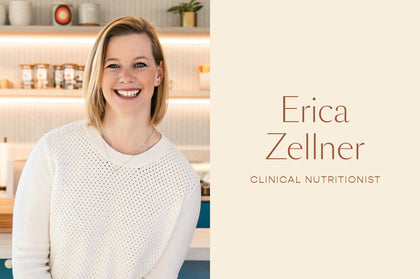Like all parts of the body, your hair is dependent on certain levels of nutrients, balanced hormones and more to remain healthy. Unfortunately, when the proper level of nutrients is not met (such as from poor dietary choices), it can result in hair growth cycle changes that may take months to correct.
As a clinical nutritionist, I often see the following nutritional pitfalls with my patients. Fortunately, these missteps are often easily corrected. Here are the ways you may be unintentionally harming your hair and what products you really should be using to encourage hair wellness.
#include-related-slider#
4 Nutrition Choices That Impact Your Hair
What you eat or don't eat is often driven by how it impacts your body and mind. But did you know your nutrition choices can impact your hair too? Here are four common nutrition choices that may be impacting your hair's wellness:
1. You’re Eating a High-Carb Diet
Excess sugar in your diet (via starchy foods like bread, pasta and baked goods or highly sugary foods like candy) can damage blood vessels that are responsible for carrying oxygen and nutrients to your hair follicles. Over time, this can cause a condition called insulin resistance, which can negatively affect your hair growth cycle.
Insulin is a hormone that controls many processes in the body, including moving glucose and nutrients from your blood into your cells. If insulin is chronically elevated from a very high carbohydrate diet, your cells can become less sensitive to its signals. Insulin resistance, in which your cells stop responding to insulin, is incredibly common. In fact, over 32% of the U.S. population may have this condition — many without even knowing it!
Best Seller: GRO More Kit
What to Do Instead
Researchers have found that there is an “undeniable role of chronic hyperinsulinemia” and hair loss. Fortunately, lifestyle changes can support healing insulin resistance.
Focus on a whole foods-based diet that balances fiber, fat, protein and carbohydrates to support healthy blood sugar rise and fall. Regular exercise can also correct insulin resistance by making cells more sensitive to insulin signals.
2. You’re Intentionally Eating Too Few Carbs
Very low carbohydrate diets, like the Keto diet, have become increasingly popular, promising everything from effortless weight loss to longevity. Unfortunately, very low carbohydrate diets can also cause some negative health effects, especially for your hair!
Typically, your body uses carbohydrates from the food you eat for energy and essential functions. When you restrict carbs for an extended period of time, you may end up in a state of ketosis. Basically, this means your liver is making ketones to use as fuel since glucose isn’t available.
For your hair, this state can spell disaster. When in ketosis, you’re more likely to be consuming fewer necessary nutrients. Many of our most nutrient-dense foods (like vegetables and fruit) are strictly limited on a very low carbohydrate diet. By reducing the variety and amount of nutrients you’re regularly taking in, your body may not be able to grow healthy hair.
Additionally, in a state of ketosis, it’s likely you’re also consuming fewer calories. In this situation, your body will prioritize essential functions (like making sure your heart keeps beating and your lungs keep taking in air!) over nonessential functions such as hair growth.
What to Do Instead
Consider a moderate-carb diet that includes a lot of variety. Make sure you’re providing your body with enough fiber, fat, protein and carbohydrates to support your energy needs.
Also, consider GRO Biotin Gummies to boost your nutritional intake. Each gummy contains a host of beneficial vitamins and minerals that are known to support shinier, healthier and stronger-looking locks.
3. You’re Stuck in a Yo-Yo Dieting Cycle
Have you ever gone on a short-term diet only to regain the weight you lost (or more)? If so, you’re not alone. Yo-yo dieting, otherwise known as weight cycling, is the common pattern that up to 40% of Americans are stuck in. Unfortunately, this pattern of dieting carries a number of negative health consequences and can really damage our hair.
What’s happening inside the body when we’re yo-yo dieting? A sharp decrease in calories and nutrients creates a stress-and-survival response, where the body works to prioritize only the most essential functions (and unfortunately, hair growth isn’t one of those).
The body will deplete its resources and nutrient stores, and hair enters a phase called telogen effluvium. This means that stress is causing our hair roots to prematurely go into a resting state to conserve energy. Within weeks to months, these hair strands will likely fall out. Fortunately, this condition is easily corrected by reducing the stress that the body is experiencing and having ample nutrients to support hair growth!
What to Do Instead
Avoid crash diets that cause a very sudden drop in calories and nutrients! Healthy and sustainable weight loss is 0.5-2 pounds per week, depending on how much weight you need to lose. If you’re aiming to lose weight and find that you’re dropping weight more rapidly, you’re risking unnecessary stress on your body.
Read: 26 Expert Tips for Hair Wellness
4. You’re Consuming Too Many Inflammatory Foods
The food that you consume has a direct impact on how much systemic (whole-body) inflammation you have. Hint: chronic, systemic inflammation isn’t healthy!
Unfortunately, many of the foods that make up the Standard American Diet are pro-inflammatory in nature and are best limited for long-term health. Foods that we know contribute to inflammation in the body include:
- Sugar/High Fructose Corn Syrup
- Artificial Trans Fats
- Industrially processed vegetable and seed oils
- Highly refined carbohydrates
The American Academy of Dermatology says that having chronic inflammation can lead to symptoms like shrinking hair follicles, reduced hair volume and thinning hair.
Check Out: 5 Pantry Items Erica Always Has Stocked for Healthy Hair
What to Do Instead
The good news is that there are many foods to include in your diet that are anti-inflammatory in nature and can help balance inflammation levels! Consider loading up on leafy greens, healthy fats like extra-virgin olive oil or avocados, nutrient-rich berries like blackberries or blueberries, and warming spices like ginger, turmeric, and cinnamon.
Shop Erica's Favorite Hair Wellness Products
The Bottom Line
As the saying goes, "you are what you eat" and that goes for hair, too. If hair wellness is your goal, consider how your diet may be impacting the state of your hair health and make tweaks as needed to get the healthy, beautiful hair you want.
#include-related-slider#
More From VEGAMOUR
- Can a Vitamin D Deficiency Cause Hair Loss?
- 3 Ways Nutrition Impacts Hair Growth and Loss
- What Causes Female Hair Loss at the Temples?
- Can Poor Nutrition Cause Hair Loss? A Nutritionist Says "Yes!"



















